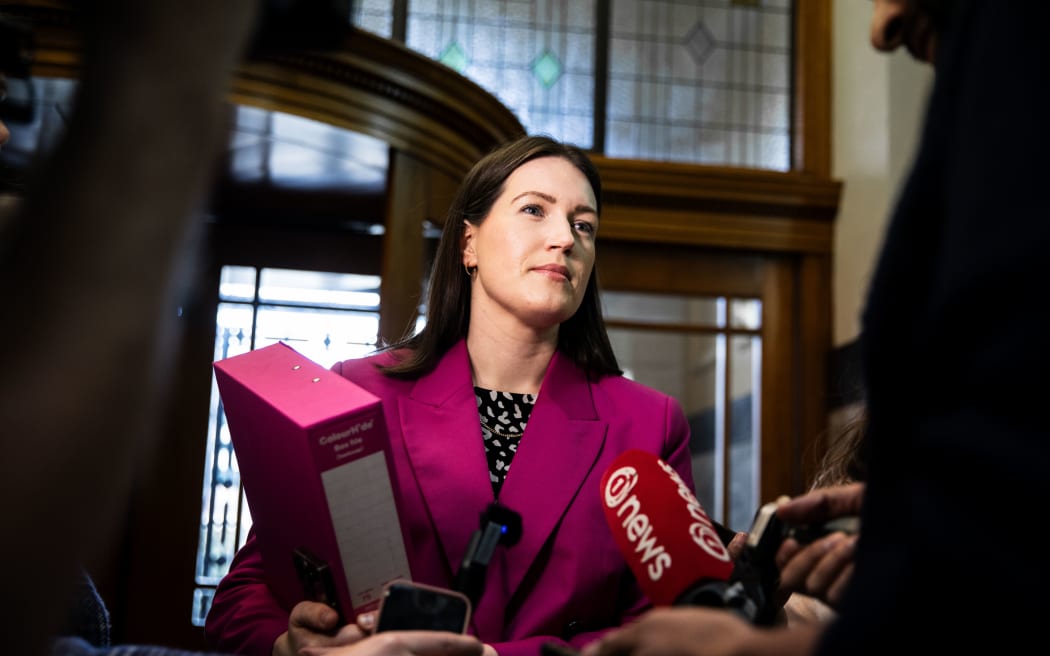
Workplace Relations Minister Brooke van Velden said the re-introduction of pay deductions gave employers the option to respond in "a more nuanced" way. Photo: RNZ / Samuel Rillstone
The government is defending the re-introduction of pay deductions for partial strikes, saying it's the public at large that bear the brunt of them.
Workplace Relations Minister Brooke van Velden fronted questions at Select Committee on Wednesday morning. In her opening remarks, she told MPs the change to collective bargaining settings would both incentivise parties to return to the negotiating table and minimise potential disruption to public services.
"When a full strike occurs, employers can respond by suspending the employee and not providing pay. In this situation, there are negative consequences for both sides," van Velden said.
"The same cannot be said for partial strike action at the moment. Currently, if an employee is engaged in a partial strike, the employer's options are to either accept the partial strike action or to lock out or suspend the employee for the duration of the strike."
Van Velden said the reintroduction of pay deductions gave employers the option to respond in "a more nuanced" way.
"I consider that enabling employers to make partial pay deductions provides the opportunity for a more balanced and appropriate response to partial strikes," she said.
"It is also more consistent with the approach in Australia and the United Kingdom, while I recognise the entitlement of employees to strike in support of the collective bargaining claims, they should not expect to do so at no cost to themselves."
Pay deductions were last introduced in 2014 under the former National government but repealed by Labour-led administration in 2018.
Its reinstatement isn't part of either coalition agreement but rather a policy Cabinet has discussed and signed off on.
It passed its first reading with support from National, ACT and New Zealand First at the end of last year.
Labour, the Greens and Te Pāti Māori opposed it.
Van Velden said on Wednesday, when passed, the law change would give employers the option of reducing an employee's pay by a proportionate amount or to deduct 10 percent of their pay.
"The ability to make a fixed deduction of 10 percent gives employers a choice in situations where it may be difficult to calculate a proportionate pay deduction, for example for a large workforce," she said.
"Without the option to make a fixed deduction, the administrative cost of calculating the proportion of work impacted could mean that it is not practical for some employers to make a deduction."
Minister answers MPs' questions
Labour MP Camilla Belich asked the Minister how it was fair that a 10 percent deduction could be used in cases where there had been a much smaller decrease in work output, suggesting it should only be adopted in "extreme" situations.
"Well, in effect, what we're doing is going back to the rules that were in place under the previous national government, which allowed for both of these abilities and that's what I've aimed to do by reinstating partial strike deductions," van Velden responded.
Belich then confirmed with the Minister that no analysis had been done to determine what was wrong with the 2018 repeal, van Velden simply saying the previous settings hit a "more appropriate" balance between the rights of workers and employers.
Answering questions about the impact of strikes on students from National's Catherine Wedd, the Minister said it was the public at large that bore the brunt of partial strike action.
"In 2023, teachers undertook strike action, where they had partial strikes, refusing to teach certain year groups, which highly disrupted student learning but also provided a disruption for parents who, at short notice, needed to find cover or work or have to pay extra for childcare when they expected their kid to actually be at school," van Velden said.
Belich put to the Minister that submitters had earlier told MPs pay reductions for partial strikes would make it "more likely" employees would opt for full strike action, causing more disruption.
"I can't speak to what would happen in the future. I can only speak to what we've seen occur in the past," van Velden replied.
"It's within people's rights to strike, and I acknowledge that, but it's up to employees within a collective to decide whether or not they'd be willing to go for a complete reduction in pay or whether or not they'd be willing to accept a 10 percent reduction or a more nuanced reduction."
Green MP Lawrence Xu-Nan asked the Minister what evidence she had that the current balance between workers and employers rights was wrong, asking for reports, research or external stakeholder engagement.
Van Velden said it was a government priority that public services were better and more efficient, referring back to her earlier comments about the public paying the price for strike action.
"It has been patients who have had increased wait times and it's the parents who have had to fork out for additional childcare costs when they expect their child to be at school and that is what we are responding to," she said.
National's Grant McCallum asked the Minister if the government was simply re-instating the principle that if an employee does a full day's work, they get a full day's pay.
"That's exactly right. I don't believe it is acceptable that a employer and the public can experience full negative consequence from a partial strike action while somebody who is not working their normal hours of work or have a disruption to regular work," van Velden said.






